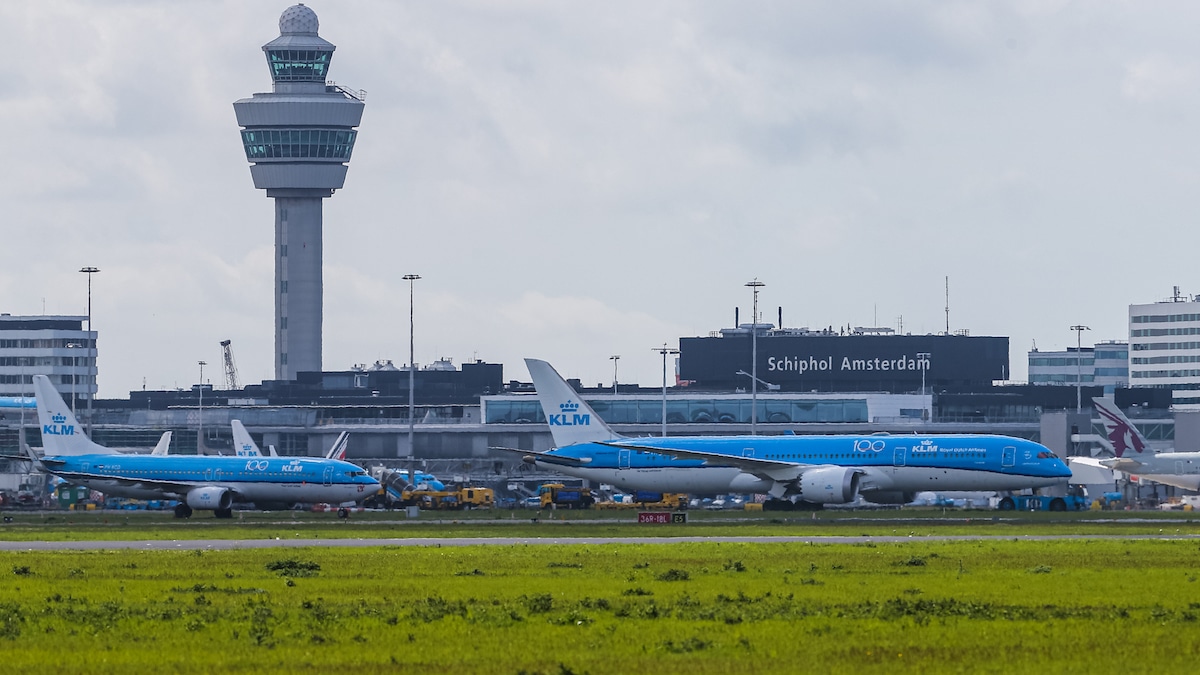Products You May Like
Airplanes at Schiphol Airport in Amsterdam, the Netherlands on May 1, 2022. Jan Kruijdenberg / BSR Agency / Getty Images
 Why you can trust us
Why you can trust us
Founded in 2005 as an Ohio-based environmental newspaper, EcoWatch is a digital platform dedicated to publishing quality, science-based content on environmental issues, causes, and solutions.
On November 5, 2022, hundreds of climate activists parked themselves down in front of private jets at Amsterdam’s Schiphol Airport and stopped them from taking off for hours.
Now, nearly five months later, the airport has announced it is banning private jets and taking further steps to reduce noise pollution and cut greenhouse gas emissions in line with the Paris agreement.
“Schiphol connects the Netherlands with the rest of the world. We want to keep doing that, but we must do it better,” Royal Schiphol Group CEO Ruud Sondag said in a statement announcing the changes Tuesday. “The only way forward is to become quieter and cleaner more rapidly. We have thought about growth but too little about its impact for too long. We need to be sustainable for our employees, the local environment and the world.”
More From EcoWatch
The airport announced the following new measures, that will go into effect no later than 2025 to 2026:
- Closing the airport to private jets.
- Barring planes from taking off between midnight and 6 a.m. and landing between midnight and 5 p.m., which will reduce total traffic by 10,000 flights per year.
- Raising standards for the type of planes that can use the airport to phase out noisier models.
- Ending plans to construct the additional Kaagbaan Runway.
The airport said that private and small business travel that takes off from Amsterdam burns around 20 times more climate-warming carbon dioxide per passenger than commercial flights. It further calculated that the three first measures together will reduce the number of people experiencing nuisance near the airport by 16 percent and the number of nearby residents being woken up at night by air traffic by 54 percent.
“I realise that our choices may have significant implications for the aviation industry, but they are necessary,” Sondag said. “This shows we mean business. It is the only way, based on concrete measures, to regain the trust of employees, passengers, neighbours, politics and society.”
In response, the Dutch wing of Air France-KLM, which supplies around 60 percent of the airport’s traffic, said in a statement reported by Bloomberg that it was surprised by the changes and that they would have “far-reaching consequences.” It further promised to share its own view of the plans with the Dutch infrastructure ministry by June 15, along with other industry groups.
Climate activists, on the other hand, have long warned about the need to limit luxury and short-haul air travel especially. Energy emissions from global aviation stood at more than two percent of the global total in 2021, according to the International Energy Agency, and they have grown more in the last few decades than emissions from other sources of transportation like cars, trains or boats. In the Netherlands in particular, activists said that Schiphol was the largest single source of emissions in the country, releasing 12 billion kilograms (approximately 26.5 billion pounds) of carbon dioxide into the atmosphere each year, as Reuters reported in November.
“We want fewer flights, more trains and a ban on unnecessary short-haul flights and private jets,” Greenpeace Netherlands campaign leader Dewi Zloch told Reuters of the 2022 protests.
At the time of the protests, Schiphol said it had promised to be zero emissions itself by 2030 and to bolster the overall industry’s goal of reaching net-zero emissions by 2050. Now, activists seem pleased with its progress.
“Finally, they seem to turn the tide,” Greenpeace air transport expert Maarten de Zeeuw told The Washington Post. “We are happy that Schiphol is listening.”
Separately, the government of the Netherlands has already said it would reduce the number of flights in the country from 500,000 to 440,000 towards the end of this year.
Subscribe to get exclusive updates in our daily newsletter!
By signing up, you agree to the Terms of Use and Privacy Policy & to receive electronic communications from EcoWatch Media Group, which may include marketing promotions, advertisements and sponsored content.
